Renren Jin
SOUP: Token-level Single-sample Mix-policy Reinforcement Learning for Large Language Models
Jan 29, 2026Abstract:On-policy reinforcement learning (RL) methods widely used for language model post-training, like Group Relative Policy Optimization (GRPO), often suffer from limited exploration and early saturation due to low sampling diversity. While off-policy data can help, current approaches that mix entire trajectories cause significant policy mismatch and instability. In this work, we propose the $\textbf{S}$ingle-sample Mix-p$\textbf{O}$licy $\textbf{U}$nified $\textbf{P}$aradigm (SOUP), a framework that unifies off- and on-policy learning within individual samples at the token level. It confines off-policy influence to the prefix of a generated sequence sampled from historical policies, while the continuation is generated on-policy. Through token-level importance ratios, SOUP effectively leverages off-policy information while preserving training stability. Extensive experiments demonstrate that SOUP consistently outperforms standard on-policy training and existing off-policy extensions. Our further analysis clarifies how our fine-grained, single-sample mix-policy training can improve both exploration and final performance in LLM RL.
Revisiting Entropy in Reinforcement Learning for Large Reasoning Models
Nov 08, 2025Abstract:Reinforcement learning with verifiable rewards (RLVR) has emerged as a predominant approach for enhancing the reasoning capabilities of large language models (LLMs). However, the entropy of LLMs usually collapses during RLVR training, causing premature convergence to suboptimal local minima and hinder further performance improvement. Although various approaches have been proposed to mitigate entropy collapse, a comprehensive study of entropy in RLVR remains lacking. To address this gap, we conduct extensive experiments to investigate the entropy dynamics of LLMs trained with RLVR and analyze how model entropy correlates with response diversity, calibration, and performance across various benchmarks. Our findings reveal that the number of off-policy updates, the diversity of training data, and the clipping thresholds in the optimization objective are critical factors influencing the entropy of LLMs trained with RLVR. Moreover, we theoretically and empirically demonstrate that tokens with positive advantages are the primary contributors to entropy collapse, and that model entropy can be effectively regulated by adjusting the relative loss weights of tokens with positive and negative advantages during training.
Joint Training And Decoding for Multilingual End-to-End Simultaneous Speech Translation
Mar 14, 2025Abstract:Recent studies on end-to-end speech translation(ST) have facilitated the exploration of multilingual end-to-end ST and end-to-end simultaneous ST. In this paper, we investigate end-to-end simultaneous speech translation in a one-to-many multilingual setting which is closer to applications in real scenarios. We explore a separate decoder architecture and a unified architecture for joint synchronous training in this scenario. To further explore knowledge transfer across languages, we propose an asynchronous training strategy on the proposed unified decoder architecture. A multi-way aligned multilingual end-to-end ST dataset was curated as a benchmark testbed to evaluate our methods. Experimental results demonstrate the effectiveness of our models on the collected dataset. Our codes and data are available at: https://github.com/XiaoMi/TED-MMST.
ProBench: Benchmarking Large Language Models in Competitive Programming
Feb 28, 2025Abstract:With reasoning language models such as OpenAI-o3 and DeepSeek-R1 emerging, large language models (LLMs) have entered a new phase of development. However, existing benchmarks for coding evaluation are gradually inadequate to assess the capability of advanced LLMs in code reasoning. To bridge the gap for high-level code reasoning assessment, we propose ProBench to benchmark LLMs in competitive programming, drawing inspiration from the International Collegiate Programming Contest. ProBench collects a comprehensive set of competitive programming problems from Codeforces, Luogu, and Nowcoder platforms during the period from July to December 2024, obtaining real test results through online submissions to ensure the fairness and accuracy of the evaluation. We establish a unified problem attribute system, including difficulty grading and algorithm tagging. With carefully collected and annotated data in ProBench, we systematically assess 9 latest LLMs in competitive programming across multiple dimensions, including thought chain analysis, error type diagnosis, and reasoning depth evaluation. Experimental results show that QwQ-32B-Preview achieves the best score of 20.93 followed by DeepSeek-V3 with a score of 16.38, suggesting that models trained with specialized reasoning tasks significantly outperform general-purpose models (even larger than reasoning-oriented models) in programming. Further analysis also reveals key areas for programming capability enhancement, e.g., algorithm adaptability and reasoning sufficiency, providing important insights for the future development of reasoning models.
Large Language Model Safety: A Holistic Survey
Dec 23, 2024



Abstract:The rapid development and deployment of large language models (LLMs) have introduced a new frontier in artificial intelligence, marked by unprecedented capabilities in natural language understanding and generation. However, the increasing integration of these models into critical applications raises substantial safety concerns, necessitating a thorough examination of their potential risks and associated mitigation strategies. This survey provides a comprehensive overview of the current landscape of LLM safety, covering four major categories: value misalignment, robustness to adversarial attacks, misuse, and autonomous AI risks. In addition to the comprehensive review of the mitigation methodologies and evaluation resources on these four aspects, we further explore four topics related to LLM safety: the safety implications of LLM agents, the role of interpretability in enhancing LLM safety, the technology roadmaps proposed and abided by a list of AI companies and institutes for LLM safety, and AI governance aimed at LLM safety with discussions on international cooperation, policy proposals, and prospective regulatory directions. Our findings underscore the necessity for a proactive, multifaceted approach to LLM safety, emphasizing the integration of technical solutions, ethical considerations, and robust governance frameworks. This survey is intended to serve as a foundational resource for academy researchers, industry practitioners, and policymakers, offering insights into the challenges and opportunities associated with the safe integration of LLMs into society. Ultimately, it seeks to contribute to the safe and beneficial development of LLMs, aligning with the overarching goal of harnessing AI for societal advancement and well-being. A curated list of related papers has been publicly available at https://github.com/tjunlp-lab/Awesome-LLM-Safety-Papers.
Star-Agents: Automatic Data Optimization with LLM Agents for Instruction Tuning
Nov 21, 2024


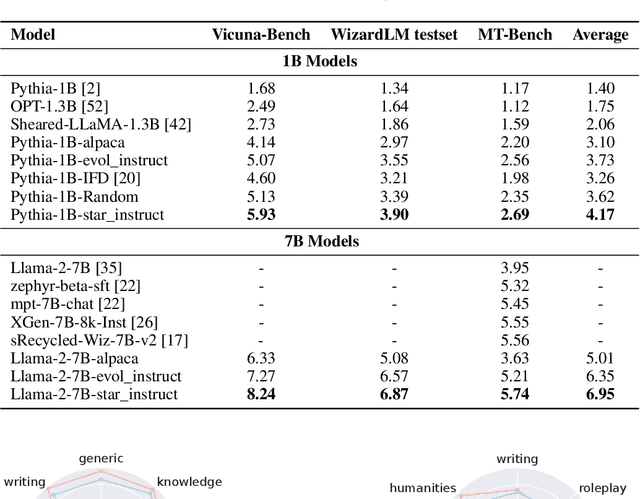
Abstract:The efficacy of large language models (LLMs) on downstream tasks usually hinges on instruction tuning, which relies critically on the quality of training data. Unfortunately, collecting high-quality and diverse data is both expensive and time-consuming. To mitigate this issue, we propose a novel Star-Agents framework, which automates the enhancement of data quality across datasets through multi-agent collaboration and assessment. The framework adopts a three-pronged strategy. It initially generates diverse instruction data with multiple LLM agents through a bespoke sampling method. Subsequently, the generated data undergo a rigorous evaluation using a dual-model method that assesses both difficulty and quality. Finaly, the above process evolves in a dynamic refinement phase, where more effective LLMs are prioritized, enhancing the overall data quality. Our empirical studies, including instruction tuning experiments with models such as Pythia and LLaMA, demonstrate the effectiveness of the proposed framework. Optimized datasets have achieved substantial improvements, with an average increase of 12% and notable gains in specific metrics, such as a 40% improvement in Fermi, as evidenced by benchmarks like MT-bench, Vicuna bench, and WizardLM testset.
Multilingual Large Language Models: A Systematic Survey
Nov 19, 2024Abstract:This paper provides a comprehensive survey of the latest research on multilingual large language models (MLLMs). MLLMs not only are able to understand and generate language across linguistic boundaries, but also represent an important advancement in artificial intelligence. We first discuss the architecture and pre-training objectives of MLLMs, highlighting the key components and methodologies that contribute to their multilingual capabilities. We then discuss the construction of multilingual pre-training and alignment datasets, underscoring the importance of data quality and diversity in enhancing MLLM performance. An important focus of this survey is on the evaluation of MLLMs. We present a detailed taxonomy and roadmap covering the assessment of MLLMs' cross-lingual knowledge, reasoning, alignment with human values, safety, interpretability and specialized applications. Specifically, we extensively discuss multilingual evaluation benchmarks and datasets, and explore the use of LLMs themselves as multilingual evaluators. To enhance MLLMs from black to white boxes, we also address the interpretability of multilingual capabilities, cross-lingual transfer and language bias within these models. Finally, we provide a comprehensive review of real-world applications of MLLMs across diverse domains, including biology, medicine, computer science, mathematics and law. We showcase how these models have driven innovation and improvements in these specialized fields while also highlighting the challenges and opportunities in deploying MLLMs within diverse language communities and application scenarios. We listed the paper related in this survey and publicly available at https://github.com/tjunlp-lab/Awesome-Multilingual-LLMs-Papers.
FuxiTranyu: A Multilingual Large Language Model Trained with Balanced Data
Aug 13, 2024
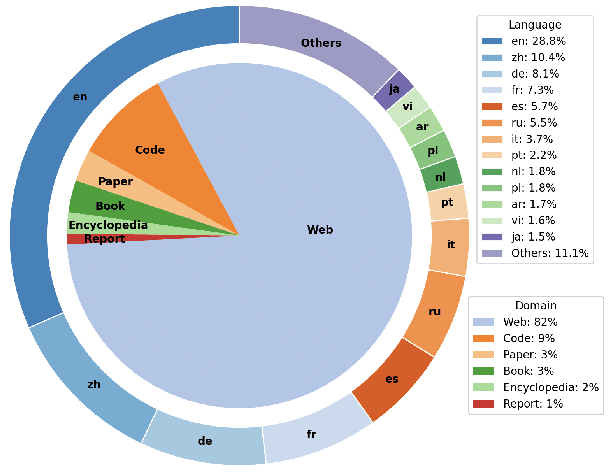
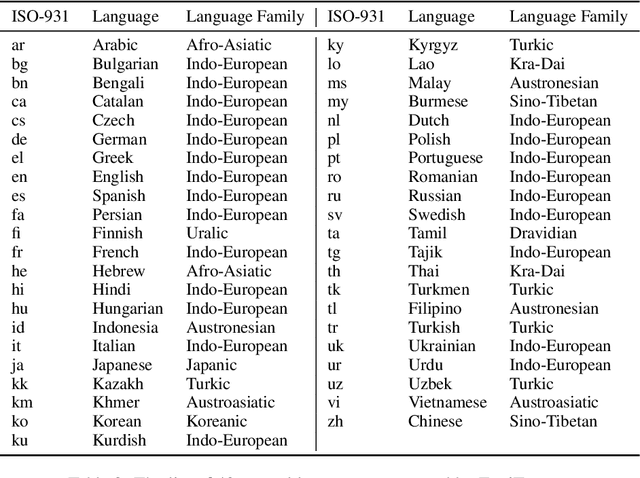
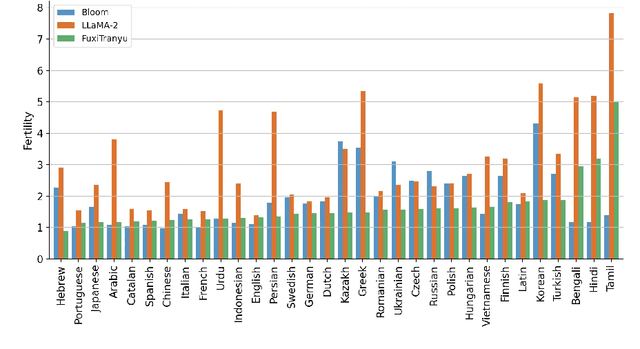
Abstract:Large language models (LLMs) have demonstrated prowess in a wide range of tasks. However, many LLMs exhibit significant performance discrepancies between high- and low-resource languages. To mitigate this challenge, we present FuxiTranyu, an open-source multilingual LLM, which is designed to satisfy the need of the research community for balanced and high-performing multilingual capabilities. FuxiTranyu-8B, the base model with 8 billion parameters, is trained from scratch on a meticulously balanced multilingual data repository that contains 600 billion tokens covering 43 natural languages and 16 programming languages. In addition to the base model, we also develop two instruction-tuned models: FuxiTranyu-8B-SFT that is fine-tuned on a diverse multilingual instruction dataset, and FuxiTranyu-8B-DPO that is further refined with DPO on a preference dataset for enhanced alignment ability. Extensive experiments on a wide range of multilingual benchmarks demonstrate the competitive performance of FuxiTranyu against existing multilingual LLMs, e.g., BLOOM-7B, PolyLM-13B, Llama-2-Chat-7B and Mistral-7B-Instruct. Interpretability analyses at both the neuron and representation level suggest that FuxiTranyu is able to learn consistent multilingual representations across different languages. To promote further research into multilingual LLMs and their working mechanisms, we release both the base and instruction-tuned FuxiTranyu models together with 58 pretraining checkpoints at HuggingFace and Github.
IRCAN: Mitigating Knowledge Conflicts in LLM Generation via Identifying and Reweighting Context-Aware Neurons
Jun 26, 2024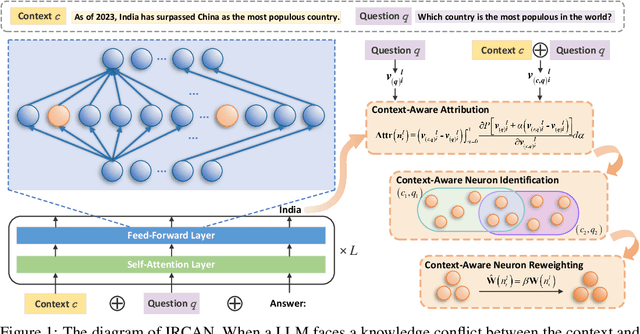

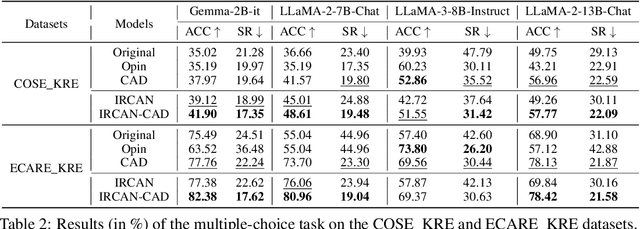
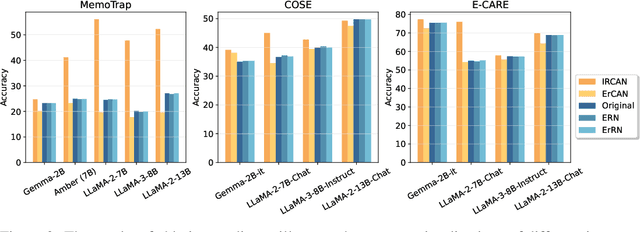
Abstract:It is widely acknowledged that large language models (LLMs) encode a vast reservoir of knowledge after being trained on mass data. Recent studies disclose knowledge conflicts in LLM generation, wherein outdated or incorrect parametric knowledge (i.e., encoded knowledge) contradicts new knowledge provided in the context. To mitigate such knowledge conflicts, we propose a novel framework, IRCAN (Identifying and Reweighting Context-Aware Neurons) to capitalize on neurons that are crucial in processing contextual cues. Specifically, IRCAN first identifies neurons that significantly contribute to context processing, utilizing a context-aware attribution score derived from integrated gradients. Subsequently, the identified context-aware neurons are strengthened via reweighting. In doing so, we steer LLMs to generate context-sensitive outputs with respect to the new knowledge provided in the context. Extensive experiments conducted across a variety of models and tasks demonstrate that IRCAN not only achieves remarkable improvements in handling knowledge conflicts but also offers a scalable, plug-andplay solution that can be integrated seamlessly with existing models.
ConTrans: Weak-to-Strong Alignment Engineering via Concept Transplantation
May 22, 2024Abstract:Ensuring large language models (LLM) behave consistently with human goals, values, and intentions is crucial for their safety but yet computationally expensive. To reduce the computational cost of alignment training of LLMs, especially for those with a huge number of parameters, and to reutilize learned value alignment, we propose ConTrans, a novel framework that enables weak-to-strong alignment transfer via concept transplantation. From the perspective of representation engineering, ConTrans refines concept vectors in value alignment from a source LLM (usually a weak yet aligned LLM). The refined concept vectors are then reformulated to adapt to the target LLM (usually a strong yet unaligned base LLM) via affine transformation. In the third step, ConTrans transplants the reformulated concept vectors into the residual stream of the target LLM. Experiments demonstrate the successful transplantation of a wide range of aligned concepts from 7B models to 13B and 70B models across multiple LLMs and LLM families. Remarkably, ConTrans even surpasses instruction-tuned models in terms of truthfulness. Experiment results validate the effectiveness of both inter-LLM-family and intra-LLM-family concept transplantation. Our work successfully demonstrates an alternative way to achieve weak-to-strong alignment generalization and control.
 Add to Chrome
Add to Chrome Add to Firefox
Add to Firefox Add to Edge
Add to Edge